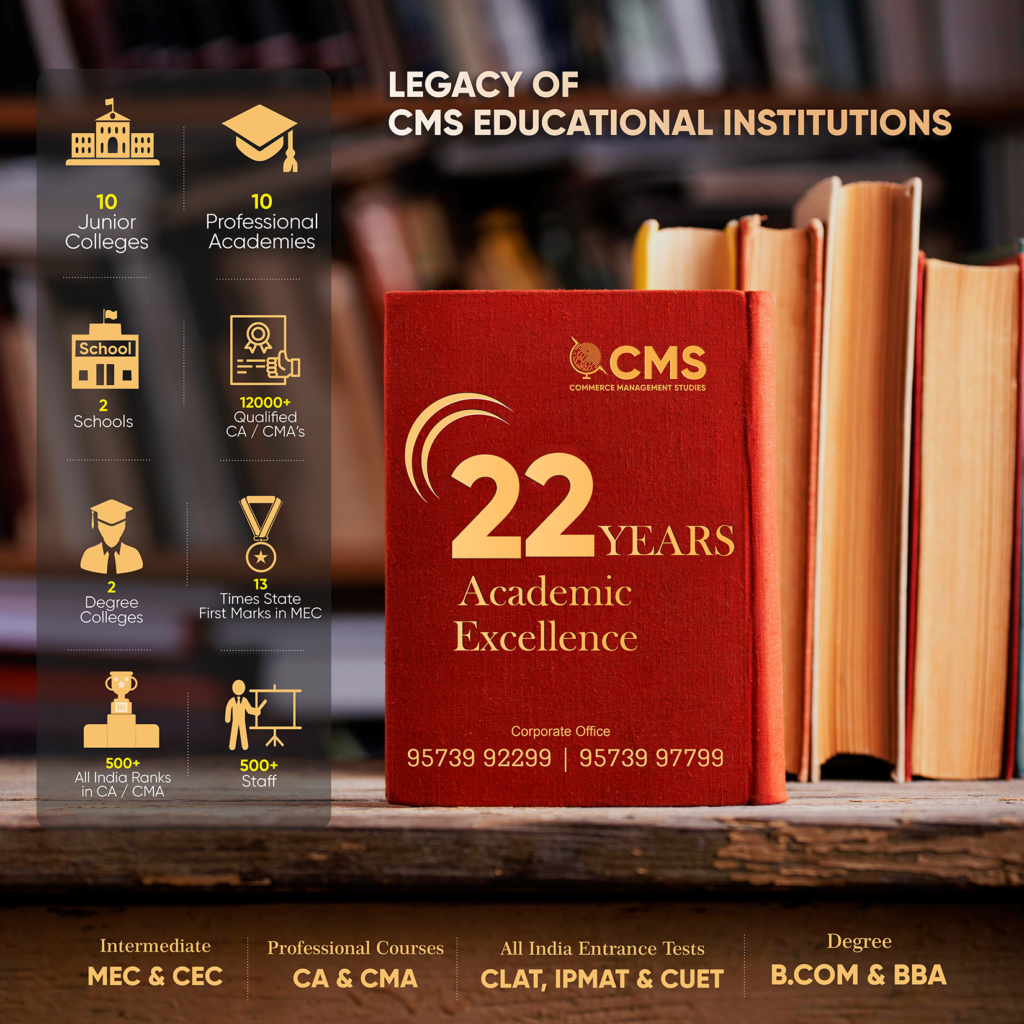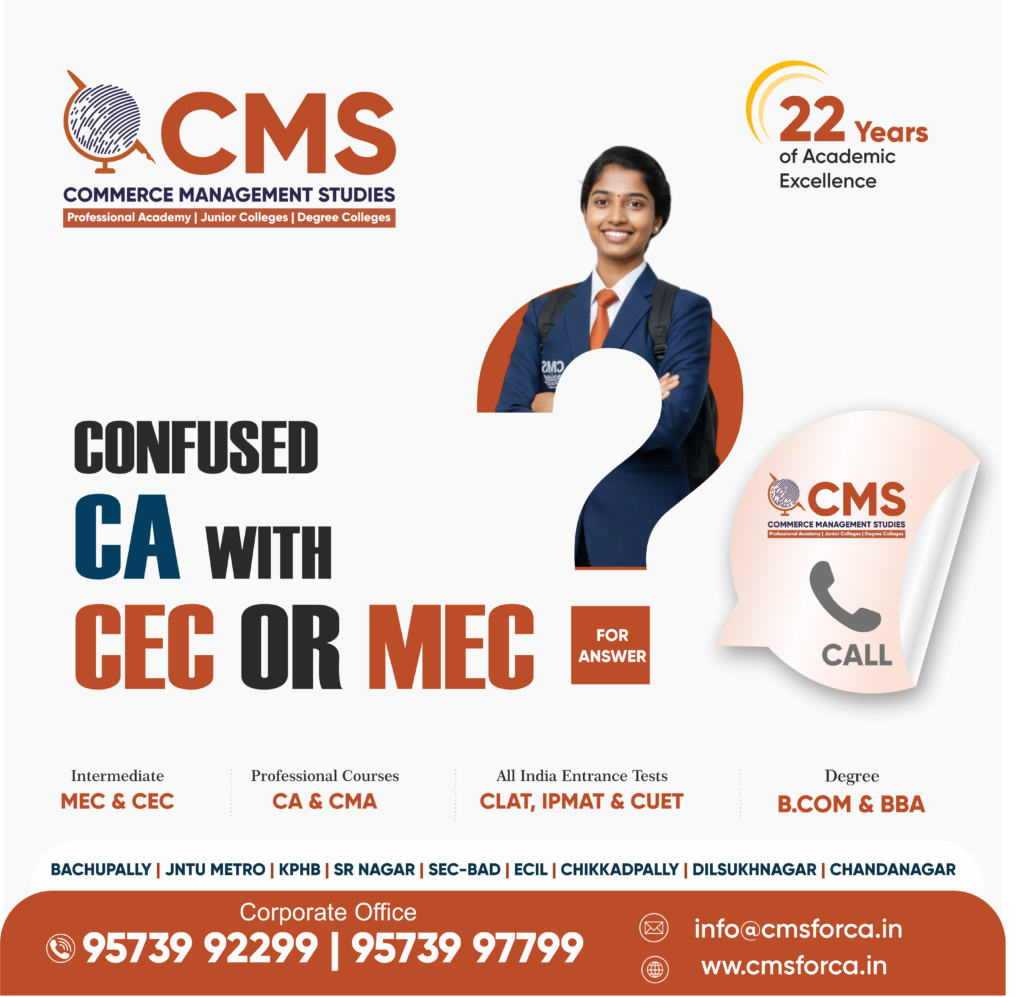


Enroll Now

CMS For CA : For Your Growth in Education
Best CMA Colleges in Hyderabad | Best CMA Coaching in Hyderabad
- Independent practice such as Cost Auditor, Surveyor, and Loss Assessor.
- Consultancy Services, Cost Management Planning & Policy, Budgeting, and Budgetary Control.
- Finance Director, Cost Controller can also be a good career.
- It also includes auditing, internal control, implementing business systems, ERP implementation etc.
CMS FOR CA- Best Trusted Institute for Delivering Benchmark Results in the CMA Foundation Exam

CMA Inter Syllabus Group 1
- Paper 5- Financial Accounting
- Paper 6- Laws & Ethics
- Paper 7- Direct Taxation
- Paper 8- Cost & Management Accounting
CMA Inter Syllabus Group 2
- Paper 9- Operating Management & Strategic Management
- Paper 10- Cost & Management Accounting & Financial Management
- Paper 11- Indirect Taxation
- Paper 12- Company Accounts & Audit
Complete Information about CMA Course (ICMAI)
- Levels
There are three main levels in the CMA course under the Syllabus 2022:
- Foundation Course
- Intermediate Course
- Final Course
(ICMAI also has entry/other qualification-based exemptions, and practical training requirement.)
- Qualification Required (Eligibility)
Level | What you must have / prerequisites |
Foundation | You must have passed Class 10 (or equivalent). To appear for the Foundation exam, you need to have passed 10+2 or its equivalent. Provisional registration is allowed even while waiting for 10+2 results. |
Intermediate | One of: • Passed the ICMAI Foundation exam. • Graduates in any discipline (or awaiting final results) from a recognised university. • Qualified Engineers. • Qualified CAT Level I of ICMAI. • CA Intermediate. Etc as per detailed qualifying exams list. |
Final | Must have passed the Intermediate Course. |
- Who Can Write?
- Foundation exam: Someone who has passed 10+2 (or equivalent), or has registered provisionally after Class 10 while awaiting 10+2 results.
- Intermediate exam: Those who satisfy the Intermediate eligibility (Foundation / Degree / other qualifying) and have enrolled/registered. Provisional registration for final year students allowed.
- Final exam: Only those who have passed Intermediate.
- How to Register / Admission
- Admission (Registration / Enrollment): Must apply to ICMAI via their Students’ Portal / Directorates. The admission (registration/enrollment) is open throughout the year, but deadline cut-offs apply for those wishing to appear in a particular term (June / December).
- For Foundation, Intermediate, Final levels, submit required documents (mark-sheets, photographs etc.).
- For Intermediate, provisional registration is allowed if awaiting results. For Final, registration after passing Intermediate.
- Registration / Tuition / Course Fee
From the ICMAI Prospectus (Syllabus 2022, Fees Structure) the fees (Inland / Foreign) are:
Level | Tuition / Coaching / Postal / Oral Fees (Inland) |
Foundation | Postal / Oral Tuition fee ~ ₹ 6,000 for Inland students. |
Intermediate | For both groups: ₹ 23,100 (Inland) |
Final | For both groups: ₹ 25,000 (Inland) |
Also there are additional fees:
- Prospectus cost: ₹ 250
- Registration / enrollment / tuition / oral/postal coaching fees as above. (Some fees are for coaching/oral/postal options)
- Exemption fees for subjects in certain cases.
- Coaching Type
ICMAI offers / allows:
- Postal Tuition (E-learning materials, workbooks, etc.)
- Oral Coaching (face-to-face classes through recognized chapters / ROCCs)
- Tutorial Workshops, Model / Sample / Mock Test Papers under the Syllabus 2022.
- Practical (Training) requirement for Intermediate students as per New Practical Training Scheme 2020.
- Examination for Each Level
- Exam Frequency: Twice a year, for all levels (Foundation, Intermediate, Final). Exams terms are June & December.
- Exam form submission / deadlines: There are deadlines for exam forms (via online modes / bank challans) before each term. Check ICMAI’s exam notification.
- Medium: Option to answer Intermediate & Final papers in Hindi or English.
- Subjects for Each Level with Brief Introduction (Syllabus 2022)
Foundation (4 Papers)
Paper 1: Fundamentals of Business Laws and Business Communication (FBLC)
Basics of Indian business laws, contracts, and communication skills relevant for commerce & accounting.
Paper 2: Fundamentals of Financial and Cost Accounting (FFCA)
Introductory financial and cost accounting principles, preparation of accounts.
Paper 3: Fundamentals of Business Mathematics & Statistics (FBMS)
Arithmetic, algebra, statistics, and their applications in business decision-making.
Paper 4: Fundamentals of Business Economics & Management (FBEM)
Economic concepts, demand & supply, production, management functions, and organisation behaviour.
Intermediate (8 Papers – 2 Groups)
Group I
Paper 5: Business Laws and Ethics (BLE) – Legal framework of business & corporate laws, professional ethics.
Paper 6: Financial Accounting (FA) – Advanced financial accounting, partnership, company accounts.
Paper 7: Direct and Indirect Taxation (DITX) – Income tax, GST basics, tax planning & compliance.
Paper 8: Cost Accounting (CA) – Costing methods, costing techniques, cost control & decision-making.
Group II
Paper 9: Operations Management & Strategic Management (OMSM) – Production, operations, and strategic planning.
Paper 10: Corporate Accounting & Auditing (CAA) – Company accounts, auditing standards, and assurance.
Paper 11: Financial Management & Business Data Analytics (FMDA) – Financial decision-making, data analytics for business.
Paper 12: Management Accounting (MA) – Budgeting, variance analysis, management decision-making.
Final (8 Papers – 2 Groups + Elective)
Group III
Paper 13: Corporate & Economic Laws (CEL) – Advanced corporate governance, company law, and economic legislation.
Paper 14: Strategic Financial Management (SFM) – Capital markets, portfolio management, mergers & acquisitions.
Paper 15: Direct Tax Laws & International Taxation (DIT) – Advanced direct taxes, transfer pricing, international taxation.
Paper 16: Strategic Cost Management (SCM) – Cost strategy, performance evaluation, decision-making models.
Group IV
Paper 17: Cost & Management Audit (CMAD) – Principles and practices of cost audit, management audit, reporting.
Paper 18: Corporate Financial Reporting (CFR) – Ind AS, consolidation, business combination, valuation, corporate reporting.
Paper 19: Indirect Tax Laws & Practice (ITLP) – Advanced GST, customs, indirect tax compliance and practice.
Paper 20: Elective (choose any one):
- 20A: Strategic Performance Management & Business Valuation (SPMBV) – Business valuation, corporate strategy & performance.
- 20B: Risk Management in Banking & Insurance (RMBI) – Risk frameworks, banking/insurance regulations & practices.
- 20C: Entrepreneurship & Start-Up (ENTS) – Innovation, venture creation, start-up ecosystem, entrepreneurial finance.
- Exam Qualifications / Passing Criteria
- Passing a paper: Minimum 40% marks in each paper.
- Passing a group: If paper-wise pass (≥ 40%) and aggregate (across non-exempted papers in that group) 50% or more.
- To pass the exam level: All groups must be passed (i.e. all papers / groups). For Intermediate and Final levels.
- Exemptions: If you score 60% or more in a paper, you may get exemption in that subject (for certain terms / non-exempted papers) under Syllabus 2022.
- Other Important Details
- Practical Training Requirement: Students who register for Intermediate on or after 11 Feb 2020 must undergo practical training for 15 months in recognized organisations/areas before final exam.
- Exam results / marksheets: Foundation result marksheet is downloadable (no physical hard copy sent). Intermediate / Final get Pass Certificates; Foundation does not issue rank certs or pass certificate.
- Verification / Photocopy of answer scripts: Students can apply for verification / photocopy of answer scripts within certain time windows, for a fee. For example, verification of answer papers costs ₹ 250 per paper, photocopying is ₹ 500 etc.
- Exemptions based on prior qualification: There exist subject-exemptions for certain degrees, CA / CS / CAT / engineering etc under certain conditions.
- Admission deadlines / Cut-off Dates: To appear in a term (June / December), you must have your registration done before cut-off (e.g., 31 January for June term, 31 July for December).
- Exemptions & fee of exemption: Exemption fee per subject is applicable.
